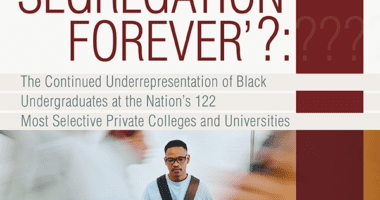How Policymakers Can Help Higher Education Better Serve Students
So far, several Democratic presidential candidates have put forth various ambitious plans that could potentially help college students: from free college to cancellation of student debt. As the election cycle ramps up, it’s clear that the need to make higher education more affordable and more accessible has risen as a top issue for everyday people, educators, activists, the media, presidential candidates, and policymakers.
The biggest problem is the increasing costs and reliance on student debt. For a growing number of students, higher education has become a “Must Be This Tall to Ride” sign, substituting their height with what families can afford. The other problem is completion, where students are just as likely to drop out of college as they are to earn their degree. What escalatesthese problems to crisis levels is that most jobs that provide a livable wage and benefits now require a postsecondary degree or credential, but getting a high-quality degree is a struggle for many. Students are incurring debt that they cannot repay, and Black and Latino students and students from low-income families have less access to the degrees that will benefit them the most.
While colleges enroll more students from diverse backgrounds, some institutions remain unprepared and ill-equipped to meet their needs. Too few institutions are ready to address the notion that in order for college to truly benefit students and families, it matters not only that students get to college, but what happens when they get there. That’s why the role of policymakers is to make sure that what the state and federal governments spend on higher education protects students and families from fraud and abuse, and ensures all members of the public, including the marginalized, have access to high-quality education. Furthermore, policymakers should invest in colleges that are committed to providing access and opportunity; conversely, they should take action against colleges and universities where earning a degree is rare and unlikely to pay off. It’s called accountability.
As Congress considers reauthorizing the Higher Education Act (HEA), there is an opportunity to support low-income students and students of color and the colleges they attend, hold campuses responsible for serving students well, and protect students and families from predatory colleges and universities. Recent efforts to increase access to higher education mean more students from low-income families and students of color are going to college, but they are still less likely than their peers to actually leave with a degree. For example, Ed Trust reports that in 41 states, the likelihood that White adults have a college degree is 16.3 percentage points higher than that of Black adults and 24.5 percentage points higher than that of Latino adults.
Improving college access and success is a bipartisan issue. Sen. Lamar Alexander (R-Tenn.), the chairman of the Senate Committee on Health, Education, Labor, and Pensions (HELP), Sen. Patty Murray (D-Wash.), the ranking Democrat on the HELP Committee, and Sen. Chris Murphy (D-Conn.), another HELP Committee member, have all emphasized increasing college student success and outcomes in their priorities for HEA reauthorization. As chairman, Sen. Alexander has committed to holding colleges and universities responsible if borrowers are facing challenges making progress on repaying their loads. Sen. Murray has called for an end to the predatory practices that leave students worse off, while Sen. Murphy is proposing policy that would require greater transparency, create consequences for colleges that have poor student outcomes, and provide supports to colleges to improve student outcome.
When seeking out the best policy solutions, Ed Trust reached out to experts that include leaders from Historically Black Colleges and Universities, associations that partner with these leaders, civil rights organizations, and scholars that study the impact of policy on student outcomes and equity. The consensus is that success is not evidenced only by a high rate of students graduating, but also by a commitment to enroll and provide high-quality opportunities to those students for whom a college degree will benefit the most. As such, Ed Trust suggests policymakers take the following steps to help higher education serve ALL students better:
- Safeguard and strengthen student consumer protection policies like gainful employment and borrower defense, which are designed to protect students from predatory colleges and universities. History has shown that, given the chance, many for-profit institutions will take advantage of the availability of federal grants and loans at students’ expense, leaving students worse off than when they started. As the current Department of Education continues to roll back the regulations aimed at improving opportunity and outcomes in higher education, it’s even more critical that Congress does not walk away from these protections.
- Improve higher education data to create greater transparency and understanding of opportunity, value, and outcomes, especially the information that captures what is happening in regard to higher ed opportunity for students of color and students from low-income families.
- Hold campuses responsible for providing college opportunity by enrolling a reasonable share of students of color and students from low-income families, and ensuring all students achieve success.
- Invest in colleges that are committed to equity and have been historically under-resourced so that they can implement evidence-based strategies to support student success.
- Enforce meaningful consequences for colleges that after given time, resources, and support, fail to improve their efforts to provide college opportunity and outcomes.
Given the disparities in retention, graduation, and job placement rates for students from low-income families and students of color, it is imperative that Congress create a system of higher education that holds institutions responsible for effectively serving all students. This is not punitive accountability, but rather an articulation of higher education expectations. With a new HEA focused on equity, Congress can ensure that institutions are prepared to serve students of color and students from low-income families, and that the resources and incentives are there to help all institutions of higher education improve. This proposal can help shape a system of higher education that is more just and equitable for the students and families served, the higher education leaders who labor in it, and the taxpayers who support the entire system.









